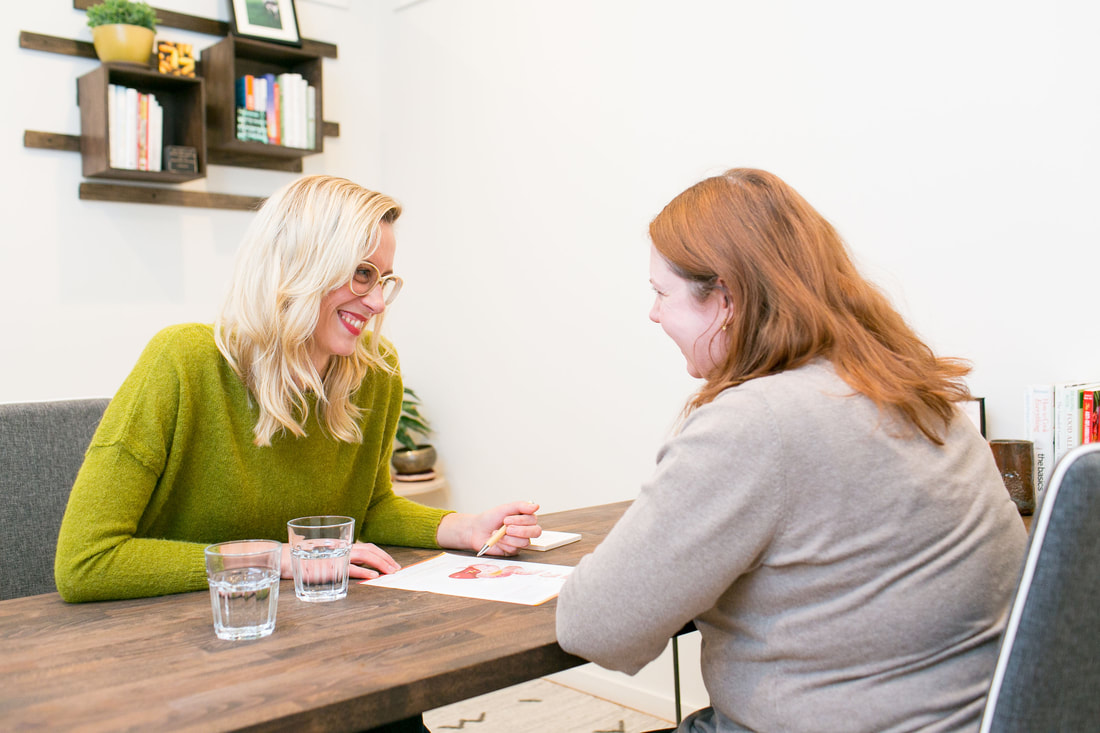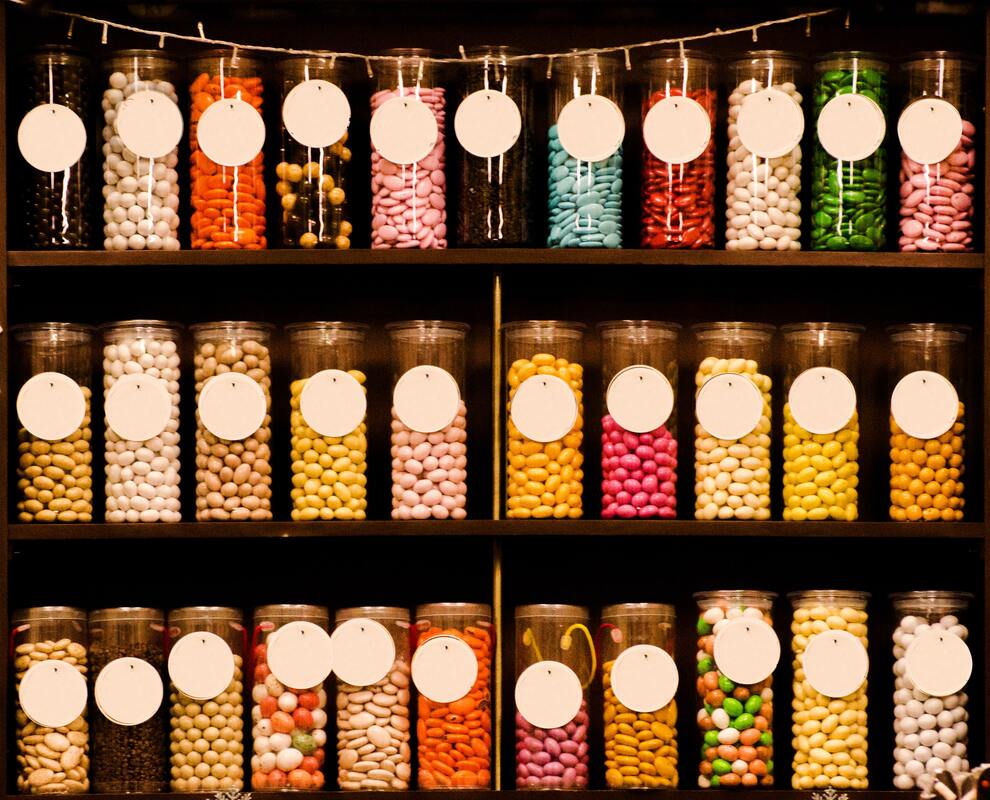|
I recently saw my 500th nutrition client, which was such a sweet mile marker to reach in my practice.
In the past week, though, I also had four separate conversations that included the question, "so what does a nutritionist do, anyway?" It made me pause - and laugh - and realize this article was long overdue! You see, the answer is not straight-forward. Sure I talk to people about what they eat. I tie that back to how they feel and help them find ways of using food to find better balance in their bodies. When talking with someone about their health challenges and goals, my mind is running metabolic pathways to hack the biochemistry (which is fueled by nutrients) that needs correcting to resolve the issues and help my client feel their best. I recommend food plans, share recipes, help put together menus and make supplement recommendations. If you looked up the job description for a nutrition professional, this is essentially what you would find. And this is also where my approach diverges from that definition, conventional nutrition therapy and even from functional medicine (I have education in both approaches). Here's the divergence: I know that food is deeply personal. It is more than just calories and nutrients. Food is ritual. It's tradition, religion, culture. Food is comfort; a foe and a friend. We are as likely to choose food because of its cost, convenience and accessibility as we are to choose food because it's "good" for us, and our food choices also reflect our political, ethical and moral values. We have a lot of thoughts, beliefs and feelings about what our food choices say about us. Our self-image is wrapped up in what is on our plate and there's often a running tape of all the things we "should" and "should not" be eating. So, let me say it again: food is personal. We can't ignore that when using food to heal. Instead, it lays the foundation for my work with each client. Together, we explore the ways that relationship with food and their body. I integrate mind-body medicine into each treatment plan to build self-care tools in mindfulness and self-compassion that my clients take with them into holidays, birthdays, vacations and times of high stress. We work on cultivating and nurturing change from within with one delicious meal at a time. I don't ignore all that nerdy biochemistry that I love, but bring it alongside an examination of habits, imbedded messages, cultural traditions, food access, self-talk and other influencers that make sneaky contributions to dysfunction and disease. This is what makes my job so fun! I love putting the pieces together for my clients and holding space for them to experience their health and relationship with food and their body differently. Full truth: there are no quick fixes in this approach. No band-aides. No golden tickets. But in each of those 500 cases, there is movement. There is growth and change that leads to the kind of healing that is not only sustainable, but pleasurable. I welcome you into that space with me whenever you're ready.
0 Comments
I sat down to write this article numerous times and was distracted time and again by other, smaller tasks...like playing Candy Crush. Addressing the concept of willpower head-on feels daunting, especially during a pandemic when my surge capacity is depleted. Every day, I'm questing for the well of willpower that got me through starting two businesses and finishing grad school - at the same time. I know I am capable of managing A LOT, and yet lately that capacity is sorely lacking! I know I am not alone. The Webster dictionary describes willpower as "control exerted to do something or restrain impulses." This definition provides the perspective that with practice, your willpower can be strong enough to get you anything you desire. Here are some ways we can flex that willpower muscle and attain our dreams:
Ok, so willpower is a muscle that can be strengthened with intention and dedication. Got it. (Step 1. Consider what I get from playing Candy Crush.) Now, here's a piece of the willpower concept that keeps tripping me up: why is it that sometimes willpower is strong and sometimes it is so weak, fickle, laughable? Psychology researchers acknowledge this in their broader definition of willpower. In their expanded definition, they acknowledge that willpower is a limited resource capable of being depleted. We learned that flexing our willpower too much will deplete it - we need to be able to chill out sometimes. What else could deplete willpower? Would the stress of living through a pandemic be enough to deplete willpower? Would existing alongside a social reckoning be enough to deplete willpower? Would the threat of economic collapse do the trick? How about food insecurity? Housing insecurity? A demand for physically distancing that keeps you out of the arms of your loved ones? Celebrating life's important moments with a screen and many miles between you and your people? Confining your life to the walls of your home where you have to really work at it to escape yourself? And what about living through and alongside all of those things at once? Would that be enough to deplete willpower? I think yes. Here's my point: do the things and then let go of the times you don't do the things. Your willpower is probably not at it's strongest right now. But that doesn't mean you should put off working on yourself. Now is a great time to work on your health and wellbeing. Now is also a very challenging time to work on your health and wellbeing. Your progress will probably be slower. That's ok! Remember that your health is made up of tiny choices you make all day, every day. Focusing on those small choices one at a time makes a difference, and adds up to big changes. Now might be a good time to ask for some help and get support. Engaging with someone outside of yourself will give you perspective so you can celebrate those small victories and recognize when your willpower is even the slightest bit stronger. It all counts. References: How to boost your willpower by Denise Cummins, PhD What you need to know about willpower: The psychological science of self-control Every client I met with last week said (a variation) of the same thing:
"With everything that's going on in the world right now, taking care of myself feels low priority." I get it. Things are really wild right now. We're all holding A LOT: a pandemic, an uprising. We're faced with our mortality while examining our thoughts, behaviors and actions that are either a solution to the problem or part of the problem. We're talking about hard stuff every day while trapped in our homes. This is uncomfortable stuff. It's also the stuff that changes the course of humanity. So keep doing the good work...AND let's get you back to caring for yourself while you're doing it. I keep coming across the flight attendants' reminder from the beginning of every flight: put on your oxygen mask before trying to help someone else with theirs. This idiom reminds us that before we can do any good for anyone else, we have to first do good for ourselves. If you read nothing else on this page, read this: You are no good to any movement or cause or community or human, animal, or environment if you are not good to yourself. How you care for yourself right now might differ from how you cared for yourself before the pandemic hit the US. It might differ from how you cared for yourself before George Floyd's murder. The self-care you need now might be totally and completely new to you. Have you taken the invitation to explore that and make a self-care plan that's just for you in this specific moment in your life? Shelly Tygielski (@mindfulskatergirl) has authored a number of articles on this topic for Mindful.org related specifically to self-care during the pandemic. She gives 3 good reasons why taking time to do some internal inventory and create a plan for caring for yourself is not just important but critical. I think these are especially important for those of us who are activated by recent events in Minneapolis and the movement they sparked in our nation and world. Here are Tygielski's reasons to make a personalized Self-Care Plan: "Customizing a Self-Care Plan is a preventative measure." Ultimately, you can prevent all kinds of suffering by taking some time to reflect and strategize. You are going to be much better ally and activist when you are NOT in crisis mode. This movement needs you thinking, feeling and communicating clearly and effectively. That is not possible when you're exhausted, burned out and fueled by caffeine and sugar. "Having a plan takes the guesswork out of what to do and where to turn in moments of crisis." Don't wait until you're fried and inconsolable to decide how to care for yourself. Plan ahead, so you can respond instead of react to your circumstances and what you're experiencing in that moment. "A Self-Care Plan helps you stay the course." You don't need to put your health goals aside to participate in protests and social activism. You don't need to put yourself last because this moment feels bigger than you. This moment is bigger than you...which means that we need you to be your absolute best right now! And we need whatever action you take to be sustainable - this is a marathon, not a sprint. Now that you know you need a Self-Care Plan, follow this link to get Tygielski's directions on creating one for yourself or download this worksheet I made adapting her recommendations to a visual form. Time for true confessions: this is hard for me too. My stress response is to freeze. I have felt frozen in anxiety and fear for months now. I try to care for myself by eating regularly, exercising and meditating, but I'll go days - or even weeks - without any real success in that department. I'm more successful with my favorite dissociation techniques. I followed Tygielski's prompts to come up with my own self-care plan. Here are some activities I'm working on in my Self-Care Plan right now: Eating at regular intervals. Instead of stress eating, I tend to neglect eating when I'm stressed. This leaves me feeling my worries even more acutely. Not helpful! I'm setting a calendar reminder to go off midday every weekday to remind me to take a lunch break and again mid-afternoon to offer a snack break. Start the day with movement. Moving my body is my 2nd favorite medicine following closely behind my #1: eating delicious food. I tend to come up with all kinds of excuses about why I can't exercise as the day goes on, so I'm working this into a morning routine. Which brings me to... Meditate daily. I am needing more grounding and focus right now. I am still sheltering in place, which means my life schedule is lacking the kind of structure I had before of going to the office and the gym, etc. I am not good at maintaining a routine, so without structure to my day I feel untethered. Meditation helps me connect to myself in a very helpful way. I'm working on 20 minutes every morning after my morning movement. As you're working on your own Self-Care Plan, notice any resistance you have to giving to yourself. Here are some wise words from Rachel Elizabeth Cargle (@rachel.cargle) that helped me put this in perspective for myself this week: "...Meditate AND call your senator. Go to yoga AND go vote. Breathe deeply AND donate to causes that matter. Go on a retreat AND go support small businesses. Enjoy your essential oils AND check people on their bullshit in the community." Alia Crum, PhD is this genius of a human who has cracked the code on "mind over matter." Dr. Crum researches the placebo effect and how mindset influences human experiences. In one study, she measured ghrelin - the "hunger" hormone - after research participants drank milkshakes. One group was told that their milkshake was indulgent while the other group was told their milkshake was good for them. Ghrelin was lower in the group that thought their milkshake was a yummy treat, meaning that they were more satisfied by it than the other group. In another study she conducted, Dr. Crum educated housekeepers at a hotel that their job was physically exerting. Prior to that conversation, the housekeepers really just thought that everyday they went to work, not that their work was exercise. After their mindset shifted, they lost weight. If thoughts can change hormones and promote weight loss, what else can they do? Can changing your mindset be the piece missing from your wellness plan? Could your thoughts be the root cause of your dis-ease? Consider this: If you have an autoimmune disease, how you can mute your inner critic? If you suffer from constipation, what do you need to let go of? If you have acid reflux/heartburn, what are you forcing yourself to swallow? What are you not saying/expressing? If you have heart disease, how can you free the emotions you have repressed? If you have eczema/psoriasis/acne, what experience have you had that you need to talk about? That thing you went through that's trying to get out? If you experience any physical symptom, what mindset do you need to adapt to change it? To watch a 5 minute video from Dr. Crum, follow this link. |
I love food.I love thinking about it, talking about it, writing about it. I love growing food, cooking and eating food. I use this space to try to convey that. Follow me on social media for more day-to-day inspiration on these topics. Categories
All
|




 RSS Feed
RSS Feed